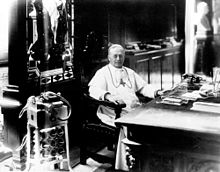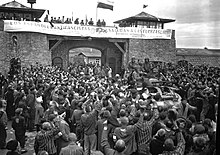User:Auggie456/sandbox
Intro[edit]
Anti-communism is political and ideological opposition to communism. Various political movements, including conservatism, fascism, liberalism, nationalism, social democracy, anarchism, or libertarianism, socialism, and Leftism, possess anti-communist elements. Anti-communism has also been expressed in philosophy, by several religious groups, and in literature. Some well-known proponents of anti-communism have been former communists.
Anti-communism has also been prominent among movements resisting Communist governance.
In the United States, anti-communism came to prominence during the First Red Scare of 1919–1920. During the 1920s and 1930s, opposition to communism in Europe was promoted by conservatives, fascists, liberals, and social democrats. In 1936, the Anti Comintern Pact, initially between Nazi Germany and the Empire of Japan, was formed as an anti-communist alliance.[1] In Asia, the Empire of Japan and the Kuomintang (the Chinese Nationalist Party) were the leading anti-communist forces during this period. During World War II, the communist Soviet Union was among major Allied nations fighting the Axis Powers.[2]
Shortly after the end of World War II, rivalry between the Marxist–Leninist Soviet Union and liberal-capitalist United States resulted in the Cold War. During this period, the United States government played a leading role in supporting global anti-communism as part of its containment policy. Military conflicts between Communists and anti-Communists occured in various parts of the world, including during the Chinese Civil War, the Korean War, the Malayan Emergency, the Vietnam War, the Soviet–Afghan War and Operation Condor. NATO was founded as an anti-communist military alliance in 1949, and continued throughout the Cold War.
After the Revolutions of 1989 and the dissolution of the Soviet Union in 1991, most of the world's Marxist–Leninist governments were overthrown, and the Cold War ended. Nevertheless, anti-communism remains an important intellectual element of many contemporary political movements. Organized anti-communist movements remain in opposition to People's Republic of China and other Communist nations.
Spain[edit]
Pre-Francoist Spain[edit]
In Spain, anti-communism has been present in both the political left and right.
In the decade preceding the Spanish Civil War, the Communist Party of Spain (PCE) was overshadowed by and competed with Spain's anarcho-syndicalist and Socialist counterparts.[3] Under the dictatorship of Miguel Primo de Rivera, "...most prominent party members were jailed..." (Mujal-León, 7) party headquarters were moved to Paris.[4] Furthermore, the party was weakened by factionalism in the Comintern and the poor representatives it was sent from Moscow.[4] Until 1934, when the PCE joined Manuel Azaña's government, the PCE opposed the Republic.[4] Left consolidation under Prime Minister Azaña corresponded with the Comintern directive[5] to form broad coalitions opposing fascism.[4] Upon their 1934 merger with the PSOE under the Alianza Obrera[5], the communists reversed their view on the Republic and their influence expanded.[4] Between 1934 and 1936, the PCE's membership grew from approximately one thousand to thirty thousand.[6]
During the Spanish Civil War, the PCE was uncharacteristically moderate, prioritized garnering middle-class support and the war effort over revolutionary policy.[4]

Communists lost favor after the Republicans lost the war, and anti-communism spread to the remainder of the Spanish left. This shift was, in part, at reaction to the Molotov–Ribbentrop Pact, which was seen as as a Soviet concession to Nazi fascism, and the PCE's refusal to share the aid it received from the Soviet Union with other leftists. Some leftists blamed the PCE for the Republicans' defeat.[4]
In Spain and internationally, the Catholic Church was a critical anti-communist influence.
In the late nineteenth and early twentieth centuries, the Catholic Church retained a great deal of Spain's wealth, but were losing social influence.[7][8] The Second Republic’s new constitution “...withdrew education...from the clergy, dissolved the Jesuit order, banned monks and nuns from trading, and secularized marriage.” (Deschner,48). This marked a sharp contrast from the Restoration period, during which the Church retained a religious monopoly.[9][10] The Church reacted to this change and anti-clerical destruction of Church property by funding the Spanish Confederation of Autonomous Rights (CEDA) and denouncing the ‘red’ Republican government.[11]
In 1937, Pope Pius XI released Divini Redemptoris, an anti-communist encyclical.[12] The document reflected the attitudes of Spanish bishops, claiming that communists were slaughtering clerics and all opposed to atheism.[13]
Anti-communism was a shared ideological feature among Spain's various right-wing groups in the lead-up to the Spanish Civil War. Within the right-wing, the Catholic Church's anti-communism pulled together the political interests of the lower, agrarian classes, the landed aristocracy, and industrialists.[14] Despite these groups' political differences, The Popular Front's electoral victory in 1936 spurred Catholic authoritarians, Carlists, monarchists, some military officers, and fascists to consolidate under the Falange Española Tradicionalista y de las JONS headed by the general and future dictator, Francisco Franco.[15]

Francoist Spain[edit]
After the Nationalists won the Spanish Civil War in 1939, the Franco regime continued to retaliate and discriminate against the “...Jewish-Masonic-Communist....” (Preston, 305) Republicans. The divide between Republicans and Francoists was maintained until the regime ended in 1975.[16]
Francoist retaliation was multifaceted. No political organization outside of the Franco regime was permitted[17], and the Law of Repression of Freemasonry and Communism was enacted in 1940.[18] Under this law, the term "Communism" was applied to all revolutionary leftists, many of whom did not actually identify as Communists.[17] Political approval from the Franco regime was required “In order to obtain such vital things as a ration card or a job…” (Salvado, 127).[18]
Military courts were ordered to eliminate all political opposition to the Franco regime[17], and hundreds of thousands were executed and imprisoned under political pretenses.[19] Among these were those in the “...defeated republican constituencies...”, including “...urban workers, the rural landless, regional nationalists, liberal professionals, and ‘new’ women.” (Graham, 129). The Francoist prison system comprised two hundred camps, which separated Republican prisoners deemed recoverable, who were utilized for forced labor, from the rest, who were immediately killed.[16] Some in these camps were subjected to unethical human experimentation that sought to find “...the bio-psychic roots of Marxism…” (Preston, 310).[16] Additionally, thousands of exiled Republicans were forced “...to work for the German war effort” (315) or imprisoned in Nazi concentration camps. Franco “...actively encouraged Germans to detain and deport exiled Republicans” (315).[16]
Anti-communism was also perpetuated in the education system. “A quarter of all teachers…” (Graham, 132) were purged from school and university education, and Spain’s history, including that of the recent war,[18] was taught from an extremely conservative, pro-Franco perspective.[19]
 | This is a user sandbox of Auggie456. You can use it for testing or practicing edits. This is not the sandbox where you should draft your assigned article for a dashboard.wikiedu.org course. To find the right sandbox for your assignment, visit your Dashboard course page and follow the Sandbox Draft link for your assigned article in the My Articles section. |
References
- ^ Anti-Comintern Pact. (2021). In Encyclopædia Britannica. Retrieved from https://academic-eb-com.access.library.miami.edu/levels/collegiate/article/Anti-Comintern-Pact/7801
- ^ Allied powers. (2021). In Encyclopædia Britannica. Retrieved from https://academic-eb-com.access.library.miami.edu/levels/collegiate/article/Allied-powers/5812
- ^ Payne, Stanley (2004). The Spanish Civil War, Soviet Union, and Communism. Yale University Press. pp. 8–10. ISBN 9780300130782.
- ^ a b c d e f g Mujal-León, Eusebio (1983). Communism and political change in Spain. Internet Archive. Bloomington : Indiana University Press. p. 7. ISBN 978-0-253-31389-8.
- ^ a b Payne, Stanley (2006). The Collapse of the Spanish Republic, 1933-1936. Yale University Press. p. 81. ISBN 9780300130805.
- ^ Beevor, Antony (2001). The Spanish Civil War. Internet Archive. New York : Penguin Books. ISBN 978-0-14-100148-7.
- ^ Sánchez, Santiago Martínez (2013). "THE SPANISH BISHOPS AND NAZISM DURING THE SPANISH CIVIL WAR". The Catholic Historical Review. 99 (3): 499–530. ISSN 0008-8080.
- ^ Karlheinz Deschner (2013). God and the Fascists: The Vatican Alliance with Mussolini, Franco, Hitler, and Pavelic.
- ^ Bullock, Alan (1991-06-05). Hitler: A Study in Tyranny. Harper Collins. pp. 40. ISBN 978-0-06-092020-3.
alan bullock tyranny.
- ^ Morgan, Philip (2 September 2003). Fascism in Europe, 1919-1945. Routledge. pp. 32. ISBN 978-1-134-74028-4.
morgan fascism europe.
- ^ Karlheinz Deschner (2013). God and the Fascists: The Vatican Alliance with Mussolini, Franco, Hitler, and Pavelic.
- ^ Bullock, Alan (1991-06-05). Hitler: A Study in Tyranny. Harper Collins. pp. 40. ISBN 978-0-06-092020-3.
alan bullock tyranny.
- ^ "Divini Redemptoris (March 19, 1937) | PIUS XI". www.vatican.va. Retrieved 2021-03-09.
- ^ Preston, Paul (1990). The politics of revenge : fascism and the military in twentieth-century Spain. Internet Archive. London ; Boston : Unwin Hyman. ISBN 978-0-04-445463-2.
- ^ Preston, Paul (1990). The politics of revenge : fascism and the military in twentieth-century Spain. Internet Archive. London ; Boston : Unwin Hyman. ISBN 978-0-04-445463-2.
- ^ a b c d Preston, Paul (2007). The Spanish Civil War. New York: W. W. Norton & Co. p. 305. ISBN 0393329879.
- ^ a b c Grungel, Jean (1997). Franco's Spain. London: Hodder Education Group. pp. 25–27. ISBN 9780340663233.
- ^ a b c Salvado, Romero (1999). Twentieth-century Spain : politics and society in Spain, 1898-1998. New York: St. Martin's Press. pp. 127–133. ISBN 9780312216269.
- ^ a b Graham, Helen (2005). The Spanish Civil War. Oxford University Press. pp. 129–133. ISBN 9780192803771.
